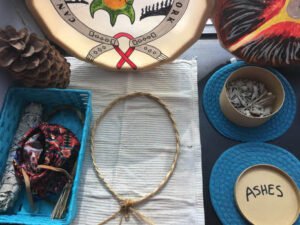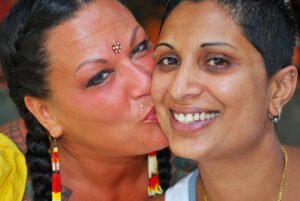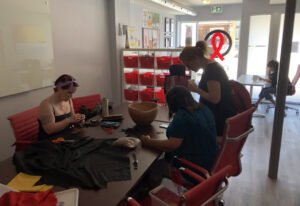Outreach
Oahas conducts outreach in the streets, neighbourhoods, events, pow wow's, agencies, in-reach in correctional facilities, hospitals, medical centres, schools and more.
Support Services
- Pre & post-test counselling
- Health & HIV/AIDS treatment information & referrals
- Support relating to HIV/AIDS discrimination issues, including referrals to legal supports
- Assistance in accessing food, clothing, and shelter
- Assistance in obtaining and/or replacing identification
- Access to traditional medicines & supports
- Advocacy
- Assistance to & from appointments
- Family support
- Grief counselling
Harm Reduction
What It Is
"Harm Reduction" refers to policies, programs and practices that aim primarily to reduce the adverse health, social and economic consequences of the use of legal and illegal psychoactive drugs without necessarily reducing drug consumption. Harm reduction benefits people who use drugs, their families and the community.
Principles
The harm reduction approach to drugs is based on a strong commitment to public health and human rights.
Harm reduction targets the causes of risks and harms. The identification of specific harms, their causes, and decisions about appropriate interventions requires proper assessment of the problem and the actions needed. The tailoring of harm reduction interventions to address the specific risks and harms must also take into account factors which may render people who use drugs particularly vulnerable, such as age, gender and incarceration.
Evidence Based
Harm reduction approaches are practical, feasible, effective, safe and cost-effective. Harm reduction has a commitment to basing policy and practice on the strongest evidence available. Most harm reduction approaches are inexpensive, easy to implement and have a high impact on individual and community health. In a world where there will never be sufficient resources, benefit is maximised when low-cost/high-impact interventions are preferred over high-cost/low-impact interventions.
Dignity And Compassion
Harm reduction practitioners accept people as they are and avoid being judgemental. People who use drugs are always somebody’s son or daughter, sister or brother or father or mother. This compassion extends to the families of people with drug problems and their communities. Harm reduction practitioners oppose the deliberate stigmatisation of people who use drugs. Describing people using language such as ‘drug abusers’, ‘a scourge’, ‘bingers’, ‘junkies’, ‘misusers’, or a ‘social evil’ perpetuates stereotypes, marginalises and creates barriers to helping people who use drugs. Terminology and language should always convey respect and tolerance.
Challenging Policies and Practices
Many factors contribute to drug-related risks and harms including the behaviour and choices of individuals, the environment in which they use drugs, and the laws and policies designed to control drug use. Many policies and practices intentionally or unintentionally create and exacerbate risks and harms for drug users. These include: the criminalization of drug use, discrimination, abusive and corrupt policing practices, restrictive and punitive laws and policies, the denial of life-saving medical care and harm reduction services, and social inequities. Harm reduction policies and practice must support individuals in changing their behaviour. But it is also essential to challenge the international and national laws and policies that create risky drug using environments and contribute to drug related harms.
From the Harm Reduction International website: www.ihra.net
Indigenous Harm Reduction
Indigenous Harm Reduction Program
The Indigenous Harm Reduction Program provides outreach and support to Indigenous people who use drugs. We work from a culturally safe place to ensure the needs of our people are met through a continuum of wholistic care. We provide FREE access to clean drug use supplies such as needles and utensils, snorting, smoking and inhalation supplies, and condoms, lube and basic health and sanitary needs such as chap sticks, clean waters, matches, ties and more.
We also supply traditional medicines and resources to access traditional supports through community networks.
We work to raise awareness and conquer stigmas through our educational talks and workshops which are co-developed and led by our peers who bring a wealth of lived experience and expect knowledge. We aim to reduce barriers to our People by educating our partners and friends in the service sector to broaden our collective awareness and responsibility to promote inclusion and access in a safe and holistic way.
We offer support services and access to resources, referrals to services and programs such as mental health, housing/shelter, treatment, employment and much more.
Our Peer Outreach Workers are our champions out there and they work tirelessly to promote harm reduction in our communities and to ensure continued opportunities for peer engagement and training and greater access to peer-led programs and services. For more information about our services please contact one of our Indigenous Harm Reduction Workers.
Education & Awareness
Education, Training and Community Development
Design and delivery of education and training to urban based First Nations, Inuit, Metis and Non-status community groups/organizations/agencies, schools, and individuals in Ontario. i.e., HIV 101, Harm Reduction, Healthy Sexuality, Talking to your Kids about S-E-X, Homophobia, Bullying, Sex after 50, Two-spirited People, Privacy, Confidentiality and Disclosure, Stigma and Discrimination, Cross-Cultural Training, and more.
Services are free, confidential and people centered.
Traditional values of respect, kindness, sharing, and caring are universally imparted throughout each of our activities, and we incorporate traditional teachings and values into our programs and services.
Oahas can be available to provide representation on community boards and planning bodies as well as participation within networks and coalitions.










